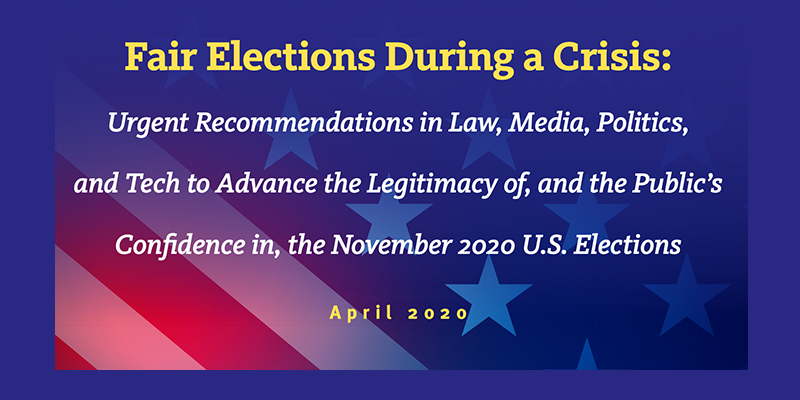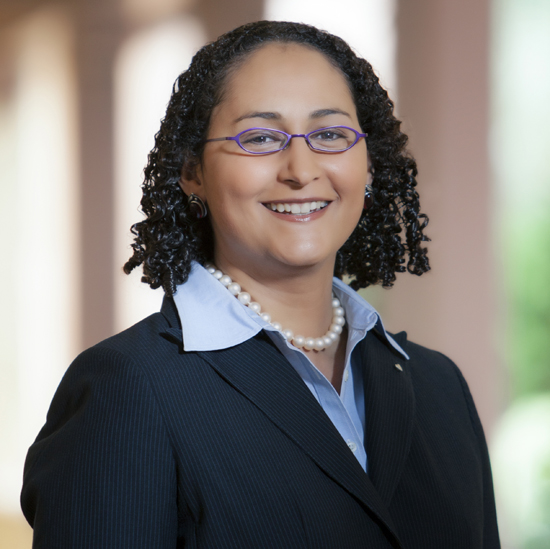Stetson Professor contributes to report on conducting fair elections during a crisis

Stetson Law Professor Ciara Torres-Spelliscy was part of a group of bipartisan and diverse scholars and thinkers in the areas of law, technology, politics, and media that created a new report to offer guidance on how to conduct fair elections during a nationwide crisis.
The 45-page report is called Fair Elections During a Crisis: Urgent Recommendations in Law, Media, Politics, and Tech to Advance the Legitimacy of, and the Public’s Confidence in, the November 2020 U.S. Elections and is available online.
It contains 14 recommendations for specific actions that key players – meaning members of the media, civic leaders, social media platforms, and government officials – should take now to minimize the chances of an election meltdown in November.
What’s the reason for concern?
Even before the worldwide COVID-19 pandemic arrived in the United States, observers of American democracy questioned the public’s faith and confidence in the results of the upcoming November 2020 U.S. elections. Concerns about peaceful transitions of power were less common a decade ago, but Americans can no longer take for granted that election losers will concede a closely-fought contest after authorities (or courts) have declared a winner. Hyperpolarization, misinformation on social media, election administration errors, foreign interference, and increasingly incendiary rhetoric around the fairness of American elections have caused public confidence in the fairness and accuracy of American elections to plummet. The COVID-19 pandemic has only exacerbated these concerns.
Recognizing the need for multifaceted solutions to the issue of the legitimacy and acceptance of fair election results in the United States, Richard L. Hasen, Chancellor’s Professor of Law and Political Science at the University of California, Irvine (UCI), convened a committee to tackle this issue from an interdisciplinary perspective.
“The American election system is under tremendous stress, and if nothing is done, we face a potential political crisis on top of the health and economic crises brought on by COVID-19,” Hasen said in a press release. “I am confident that the report’s specific, actionable recommendations — carefully crafted by scholars and leaders from across disciplines and the political spectrum — can advance both the actual fairness of the 2020 U.S. elections and the public’s confidence in them.”
What are the proposed solutions?
A key recommendation is that the media educate the public about how election counts may take longer than past years and vote margins may change during the count as election officials process large numbers of mail ballots, especially in key battleground states such as Pennsylvania and Michigan. The committee also offers a number of recommendations to ensure both election integrity and voter access during the COVID-19 pandemic.
Those include:
- States should adopt reforms to improve the absentee ballot and provisional ballot processes—both in terms of access and security.
- States should modify election procedures as necessary to deal with the rise of COVID-19, such as having a diversity of avenues for voting—in-person, absentee, curbside, on-site at hospitals and other such facilities.
- Media organizations should engage in a public information effort to provide voters with accurate information about the process by which election officials count votes and determine election winners.
- To the extent possible, states should use paper ballots or electronic machinery that produces a voter-verifiable record of the voter’s choices, in the November 2020 elections to ensure the integrity of the outcome.
Q&A with Professor Ciara Torres-Spelliscy on her role

Q. How and why did you get involved?
A. I was invited to join the group by Professor Rick Hasen of UCI Law. The conference had an intriguing premise, e.g., “Can American Democracy Survive the 2020 Elections?” I was inspired to participate because one of the goals was to draft a working paper that would be of use to policy makers who want to improve the resiliency of American elections for 2020. This reminded me of the work that I did as a lawyer at the Brennan Center’s Democracy Program.
Q. Did you learn anything new or unexpected from the process?
A. Most of my academic work is about campaign finance—how candidate elections are funded by private parties. This project focused on how elections are run by state and local governments. So this project allowed me to consider a whole new range of problems with how American elections are administered including the new challenges such as the need for widespread vote by mail that may arise if there is big spike in COVID-19 cases around the November election.
Q. Is there anything Stetson, as a law school, can or should be doing to help ensure a fair election in our community?
A. I encourage all Stetson students who are American citizens to register to vote and to vote in the election. Voter registration drives are going to have to be modified for safety because of the on-going coronavirus pandemic. I would encourage those who want to do voter registration drives to use their voices on social media to encourage their fellow Floridians to register to vote: https://registertovoteflorida.gov/home.
Students can also volunteer to be poll voters who work election day in a certain precinct and poll workers who work at early voting locations. For those in Pinellas County (St. Petersburg and Gulfport) you can find more information here: https://www.votepinellas.com/Election-Worker. Stetson Law will typically grant non-legal pro bono credit for being a poll worker.
Q. What about claims that voting by mail invites fraud?
A. This is a false narrative that has been investigated and written about extensively. At least five states already use mail balloting as the primary method of voting, and all voters have had the right to vote by mail ballot if they choose in at least 28 other states. In 2018, more than 31 million Americans cast their ballots by mail (about 25.8 percent of election participants). Despite this, fraud rates remain incredibly low. And states implement security measures including identity verification, ballot tracking through the U.S. Postal Service, secure drop-off locations and drop boxes, harsh penalties and more to help prevent fraud.
Q. Is there anything else you’d like to add?
A. In Florida, any voter can request to vote by mail. Just contact your local Supervisor of Elections, and they will send you a ballot for the November election. For example, if you live in Tampa, then you contact the Hillsborough Supervisor of Elections to vote by mail: https://www.votehillsborough.org/VOTERS/Vote-By-Mail. This is likely the most convenient and safest way to vote during a pandemic.
Post date: April 30, 2020
Media contact: Kate Bradshaw
[email protected] | 727-430-1580